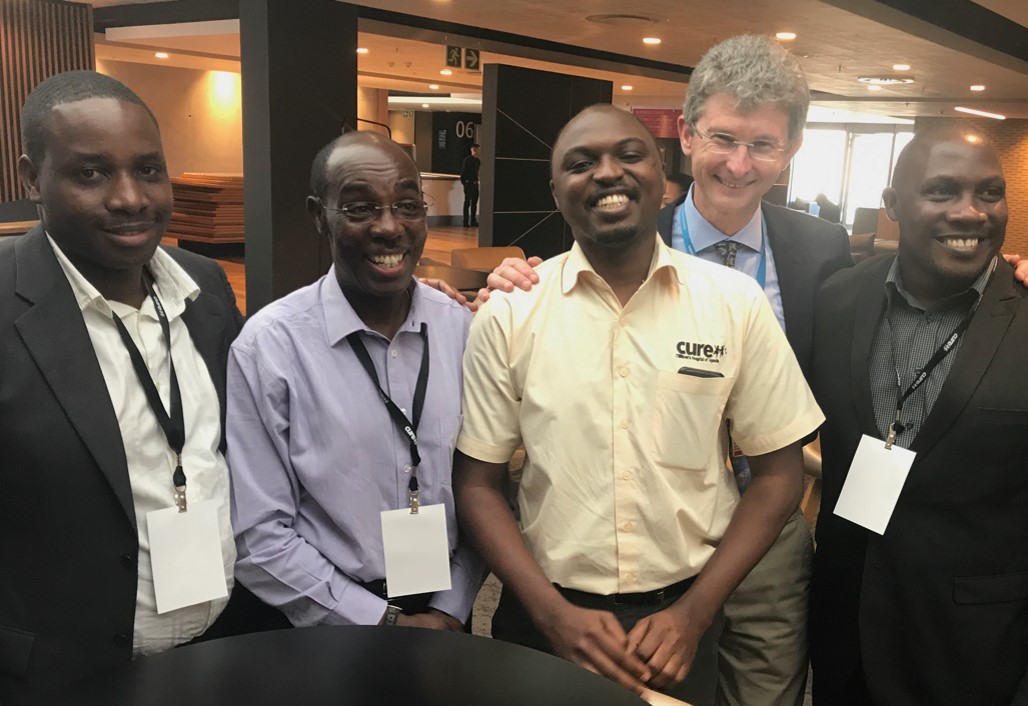
Interns
Newly-qualified doctors doing their internship at Groote Schuur Hospital have an opportunity to rotate through neurosurgery for two months as part of their four-month surgical attachment. Interns take responsibility for the day-to-day management of patients, but also have opportunities to get to theatre and acquire first-hand experience of neurosurgery. This is a great opportunity for anyone considering a career in neurosurgery.
Medical Officers
Following completion of a two-year internship and one year of community service, aspiring trainees have an opportunity to work for one year as a medical officer in neurosurgery. Typically, applicants for this post have already passed the Primary exam, but this is not a requirement. The medical officer functions as a junior registrar, taking call under supervision and rotating through the various firms. Three months is spent in the neurosurgical ICU (D13), which is excellent preparation for the Intermediate exam.
Registrars

This is the substantive training post and competition is tough as our Division has only six registrar posts funded by the Western Cape Government Department of Health. Our training program encompasses all aspects of contemporary neurosurgery, exposing registrars to the fullest spectrum of subspecialties. During their training, registrars have numerous opportunities to pursue research and are equipped with skills for lifelong enquiry.
In this way, we strive to produce neurosurgeons who have superb clinical and operative skills coupled with the intellectual rigour to cope with a career in the fast-paced and rapidly evolving field of clinical neuroscience.
A registrar contract is awarded for four years in the first instance but this is often extended by a year to ensure adequate training, and consideration is being given to increasing registrar training in neurosurgery to five years nationally. All registrars at UCT are expected to complete the exams set by the College of Neurosurgeons of South Africa, as well as complete a research dissertation for the degree MMed (Neurosurgery). Registrars rotate through the three Groote Schuur Hospital neurosurgical firms, neurocritical care and paediatric neurosurgery. Special three-month rotations for research or clinical neuroscience may be arranged.
Following completion of exams and basic registrar training, there may be an option to stay on for an additional year of subspecialty training, assuming the role of Chief Registrar.
External (Supernumerary) Registrars
Although only South African citizens and permanent residents may be appointed to funded registrar posts, we welcome trainees from other African countries who are funded independently. The Division of Neurosurgery is committed to the University’s vision to internationalise UCT through developing human resources for healthcare in Africa supernumerary’ registrars. Depending on training capacity, we take on additional trainees from elsewhere in Africa who have committed to returning home to develop neurosurgery in their own countries. A number of alumni have already returned home to provide much-needed services to their countries, and have been able to publish their experience in leading journals.
Contributing to Neurosurgery in Africa

One of our long-term goals is to help build expertise in various regions to support the establishment of world-class training centres in those parts of our continent.
Pictured on the right are Ugandan alumni Drs Emmanuel Wegoye, John Mugamba, Tomson Katungi and Peter Ssenyonga with Prof Graham Fieggen.
-
One of our graduates, Dr Emmanuel Wegoye, recently returned to Uganda where he is one of two fellowship-certified neurosurgeons offering neurosurgical care. Working with fellow Groote Schuur Hospital alumnus Dr John Mugamba at CURE Children’s Hospital of Uganda (CCHU), he treats patients from Sudan, Kenya, DRC, Rwanda, Tanzania, Eritrea, Ethiopia and as far afield as Mauritius. Uganda itself has a population of 31 million, of which 15 million are children under the age of 15 years. Our most recent appointee Dr Tomson Katungi has almost completed his training in our department and will soon be returning to CCHU.
-
Dr Peter Ssenyonga, also funded by CURE International, had a successful career as medical director of CCHU following his return to Uganda 10 years ago and is currently working as a senior consultant at Mulago National Referral Hospital in Kampala where he is involved in registrar training.
-
Dr Edwin Mogere returned to the Aga Kahn University Hospital in Nairobi, Kenya in 2015, following which we took on three Kenyan trainees in Dr Dan Ochieng, Dr Naomi Ochieng and Dr Aamir Qureshi, and have recently been joined by Dr Martin Muthinja from Kijabe Hospital.
-
Dr Kachinga Sichizya returned to Zambia 15 years ago as the first fully-trained neurosurgeon in that country and he will be assisted by Dr Manyando Lubasi when he completes his training later this year.
-
Other trainees in our program include Dr Bakang Kgaodi (Botswana), Dr Paty Kambinga (DRC), Dr Sakina Rashid (Tanzania) and Dr Moses Asante-Bremeng (Ghana).
-
Dr Mohamed Ben-Husein completed his training in 2016 with the intention of taking his skills back home to Libya and we look forward to him being able to contribute to the development of specialist services in his country.
-
A number of registrars from leading centres in Abuja and Lagos, Nigeria have spent six months with us as part of their external rotation.
Senior members of the Division have been invited to Zimbabwe, Zambia, Uganda, Kenya, Nigeria, Morocco and Egypt to teach and examine. Our expanding role in Africa was underscored by the election of Professor Fieggen as inaugural President of the Continental Association of African Neurosurgical Societies (CAANS).
Neurosurgery Innovation Laboratory
This is being developed under the leadership of Dr Nico Enslin, within the newly-opened Neuroscience Institute.